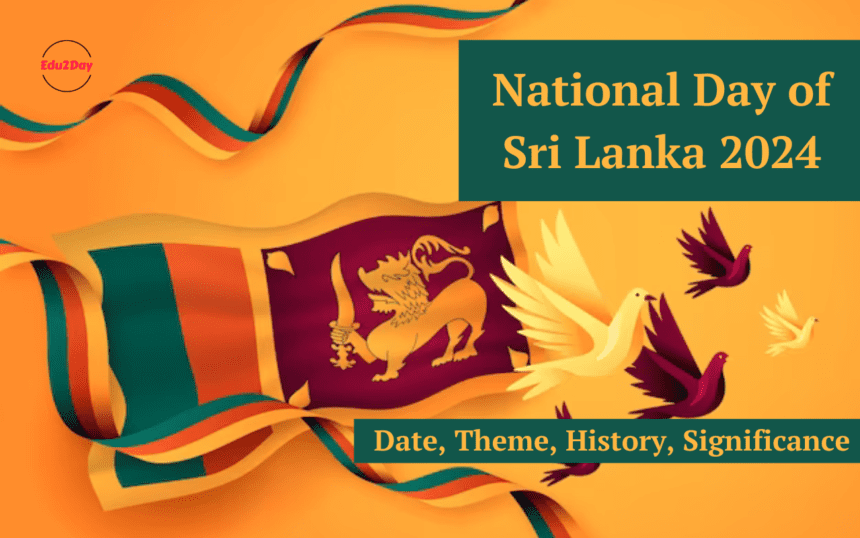National Day of Sri Lanka 2024: On February 4th, Sri Lanka observes its National Day, commemorating the nation’s liberation from British rule in 1948. People across the country celebrate this significant day with flag-hoisting ceremonies, dances, parades, and various performances.
The focal point of the celebrations is in Colombo, the capital, where the President raises the national flag and addresses the nation through a televised speech.
National Day of Sri Lanka 2024
The National Day of Sri Lanka, observed annually on February 4th, marks the country’s Independence Day. This significant event commemorates Sri Lanka’s liberation from British rule in 1948. Celebrations are held nationwide, featuring flag-hoisting ceremonies, lively dances, parades, and various performances. Colombo hosts the main festivities, where the President raises the national flag and delivers a televised speech.
The day pays tribute to the historical struggles of Sri Lanka, serving as a moment to reflect and celebrate the nation’s achievements. The Ministry of Public Administration, Home Affairs, Provincial Councils, and Local Government, under the guidance of President Gotabhaya Rajapaksa, organizes Independence Day celebrations at Independence Square.
To ensure a splendid national ceremony on February 4th, the Minister has directed authorities to undertake necessary renovations at Independence Square.
Other Important Days in February 2024
National Day of Sri Lanka 2024 Date
National Day of Sri Lanka, also known as Independence Day, holds significance as a nationwide celebration marking the political freedom gained from British rule on February 4, 1948. It is observed as a public holiday in Sri Lanka.
National Day of Sri Lanka Theme 2024
The official theme for National Day of Sri Lanka 2024 has not been announced as of now. In the past, the themes have centered around important values like national unity, peace, and development.
National Day of Sri Lanka 2024 History
The National Day of Sri Lanka, celebrated on February 4th, is a significant milestone in the country’s history, marking its freedom from British colonial rule. This day symbolizes the end of a prolonged struggle for self-determination and holds immense importance for the nation.
Early Colonial Influence and Resistance Efforts
In 1505, Portuguese colonists arrived, initiating a lengthy period of European dominance. The Dutch captured most of the island in 1656, and by 1796, the British East India Company controlled the coastal regions. The fall of the Kandy Kingdom in 1815 marked complete colonial rule.
National Awakening and the Path to Independence
During the late 19th century, an educated middle class emerged, fostering nationalist sentiments. In 1884, the Ceylon National Congress, the first major political party advocating for self-government, was formed.
The early 20th century witnessed non-violent resistance through boycotts and strikes, gaining momentum by 1931 when the Donoughmore Constitution granted limited self-government. In 1942, the State Council passed a resolution demanding complete independence.
Negotiations and the Journey to Independence
The 1943 Soulbury Commission was appointed to draft a constitution for self-government. In 1944, D.S. Senanayake formed the United National Party (UNP), advocating for dominion status within the British Empire.
The Soulbury Constitution in 1946 granted full internal self-government. The UNP won elections in 1947, and on February 4, 1948, Ceylon achieved full independence as a dominion within the British Commonwealth, with D.S. Senanayake becoming the Prime Minister.
Significance and Legacy
Independence Day signifies the end of colonial rule and the beginning of national self-determination. It led to the establishment of a democratic republic with a parliamentary system, celebrating Sri Lankan identity and cultural heritage. The legacy emphasizes national unity and progress in the face of challenges, shaping the nation’s ongoing journey.
National Day of Sri Lanka 2024 Significance
Sri Lanka’s Independence Day, observed on February 4th, holds great importance for the country, symbolizing a crucial moment in its past and a source of national pride. Here are key reasons why the National Day of Sri Lanka is significant:
- Marks the end of 446 years of colonial rule by the Portuguese, Dutch, and British.
- Represents the result of decades of struggle and sacrifices by past generations for freedom.
- Celebrates the attainment of national sovereignty and the right to self-governance.
- Fosters a sense of unity and shared identity among Sri Lankans from diverse ethnic and religious backgrounds.
- Reinforces the values of democracy, freedom, and equality embedded in the Constitution.
- Encourages contemplation of the nation’s history, culture, and traditions.
- Provides a stage to display Sri Lanka’s rich cultural heritage through traditional dances, music, and performances.
- Promotes open dialogue about addressing challenges and building a brighter future.
- Inspires hope and optimism for a peaceful and prosperous future for Sri Lankans.
- Cultivates stronger ties and partnerships with other nations based on mutual respect and cooperation.
- Highlights Sri Lanka as a vibrant and diverse nation with a rich history and a promising future.
National Day of Sri Lanka Quotes and Messages
- “Happy National Day, Sri Lanka! Today, let’s celebrate the strength, unity, and resilience that define our nation.”
- “On this special day, let’s reflect on our history with pride and look forward to a future filled with peace, prosperity, and harmony. Happy National Day, Sri Lanka!”
- “Wishing all Sri Lankans a joyous National Day! May the spirit of freedom and unity continue to thrive in our hearts and communities.”
- “Happy Independence Day, Sri Lanka! Today, we honor the sacrifices of our forefathers and celebrate the vibrant tapestry of our diverse culture.”
- “As we mark another year of independence, let’s cherish the values that bind us together as one nation. Happy National Day, Sri Lanka!”
- “On this auspicious day, let’s unite in gratitude for the freedom we enjoy. Happy National Day, Sri Lanka! May our nation continue to flourish.”
- “Warm wishes on National Day, Sri Lanka! May the colors of our flag symbolize the beauty and strength of our great nation.”
- “Happy Independence Day, Sri Lanka! Let’s celebrate the achievements of our past and embrace the opportunities that lie ahead for a brighter future.”
- “Wishing all Sri Lankans a proud and joyful National Day! May our shared history and diverse heritage continue to shape a prosperous tomorrow.”
- “On this National Day, let’s come together to appreciate the richness of our culture and the bonds that make us proud Sri Lankans. Happy Independence Day!”
Also Read: National Golden Retriever Day 2024, Date, History, Significance
National Day of Sri Lanka 2024 FAQs
Q.1. What is the significance of Sri Lanka’s National Day?
Ans. Sri Lanka’s National Day signifies the end of 446 years of colonial rule, fostering unity, freedom, and cultural pride.
Q.2. When is National Day observed in Sri Lanka?
Ans. National Day is observed annually on February 4th, commemorating the country’s independence from British rule in 1948.
Q.3. Where are the main celebrations held on National Day?
Ans. The main festivities occur in Colombo, the capital, where the President raises the national flag and delivers a televised speech.
Q.4. Who organizes the Independence Day celebrations in Sri Lanka?
Ans. The Ministry of Public Administration, Home Affairs, Provincial Councils, and Local Government, under the guidance of President Gotabhaya Rajapaksa, organizes the celebrations.
Q.5. What is the historical significance of Sri Lanka gaining independence in 1948?
Ans. Sri Lanka’s independence in 1948 marked the end of colonial rule, shaping a democratic republic with a parliamentary system and emphasizing national unity and progress.







